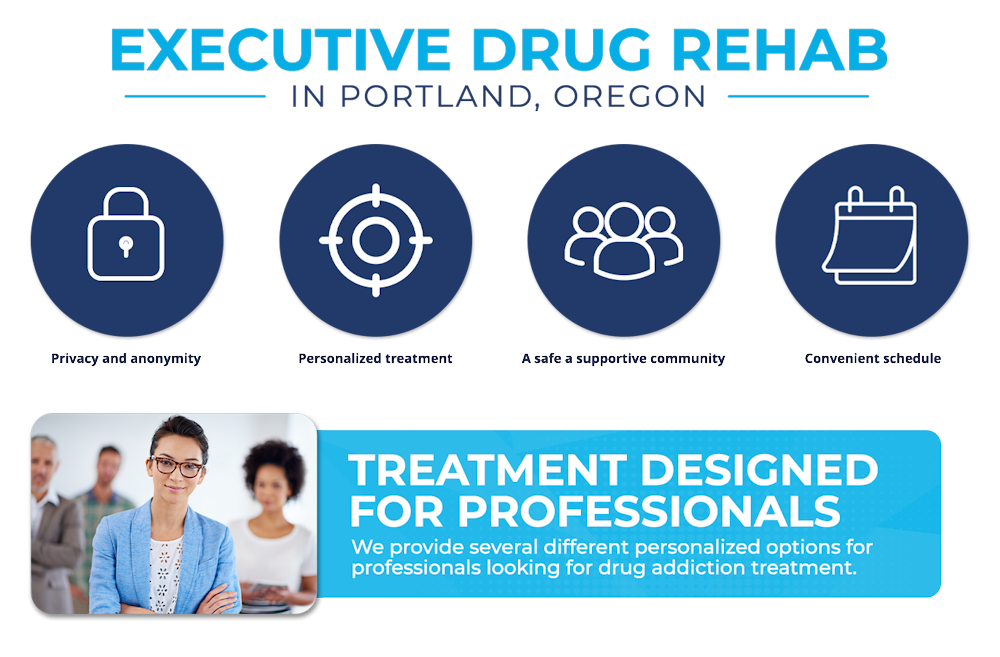Sadly, there’s sometimes a stigma surrounding individuals who struggle with drug addiction. The reality is that drug abuse and addiction can impact people from all walks of life. Some executives and other professionals struggle to find a rehab program that suits their lifestyle. Explore the details and advantages of an executive drug rehab center. Contact Crestview Recovery to learn more about our drug and alcohol rehab center by calling (866)262-0531.

Healing Begins Here
Clients Can Expect Privacy and Security
An executive drug rehab center in Oregon might be the right choice for an individual in search of a secure and stable environment for recovery. Many professionals aren’t ready to talk about their illness with their friends and colleagues, nor should they have to.
Talking about addiction is an incredibly personal decision. Some professionals will ultimately go back to work without mentioning the recovery process at all.
That’s one big reason why so many professionals opt for an executive residential and inpatient rehab center. It can offer an extra layer of security, ensuring that clients can keep their private lives private. Plus, attending an executive drug rehab center in Oregon, and particularly in a major city like Portland, means that there’s a lower chance of running into someone you know from your hometown.

A Variety of Programs to Suit Any Lifestyle
Partial hospitalization care is a rehab program that offers nearly constant accountability and treatment. While this is a fantastic option for many clients, it doesn’t always work for professionals who need to attend meetings and answer phone calls to stay on top of their careers. The good news is that there are also outpatient and intensive outpatient programs available.
These are flexible rehab programs that don’t include accommodation. While the exact schedules of these programs vary, they do leave time for busy professionals to handle their day-to-day duties. At the same time, clients can continue to focus on their own personal recovery.
Personalized Treatment to Address Individual Clients
An executive drug rehab center will address each client’s unique needs. The treatment team will develop a personalized treatment plan that includes the right mix of therapies and activities to help the client recover. This approach ensures that each client gets the individualized care they need to achieve long-term sobriety.
Choosing an Executive Drug Treatment Center in Oregon
Intensive Outpatient Program (IOP)
An intensive outpatient program (IOP) for addiction is a form of treatment that allows people to live at home and continue working or attending school while receiving care for their addiction. IOPs typically involve group therapy, individual counseling, and other support services several times per week.
Outpatient Drug Rehab
Outpatient drug rehab is a type of drug treatment that allows people to live at home while receiving treatment for addiction. Treatment typically includes counseling, group therapy, and medication. People in outpatient drug rehab can continue to work while receiving treatment.
Rehab Aftercare
Aftercare is the continued care and support that a person receives after completing a rehabilitation program. It can help people maintain sobriety, prevent relapse, and build a foundation for long-term recovery. Aftercare typically includes individual therapy, group therapy, 12-step meetings, and other support activities.
Trauma Therapy
Trauma therapy for addiction helps people who have experienced trauma heal the emotional and psychological damage that has been done. This type of therapy can help people to recover from addiction and to live healthy, fulfilling lives.
Exercise Therapy Program
This type of treatment that uses physical activity to help people recover from addiction. Exercise can help reduce withdrawal symptoms, cravings, and stress. It can also improve mood and sleep, and increase energy levels.






















